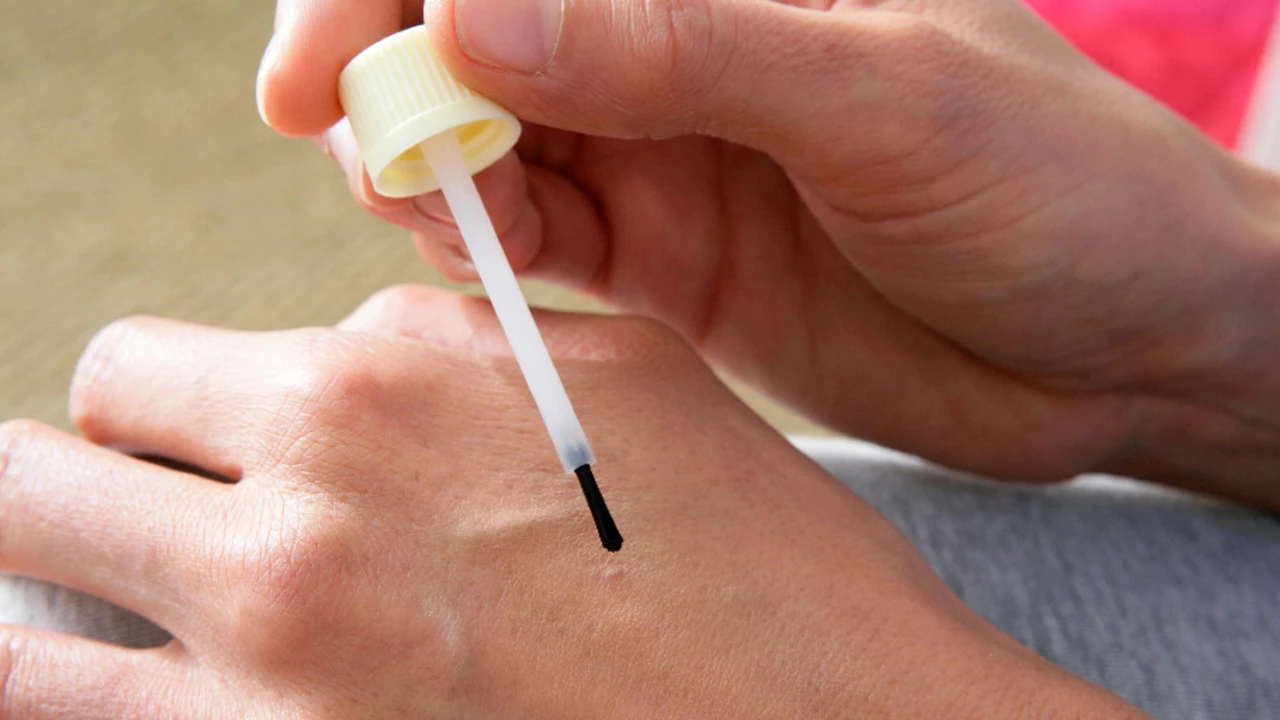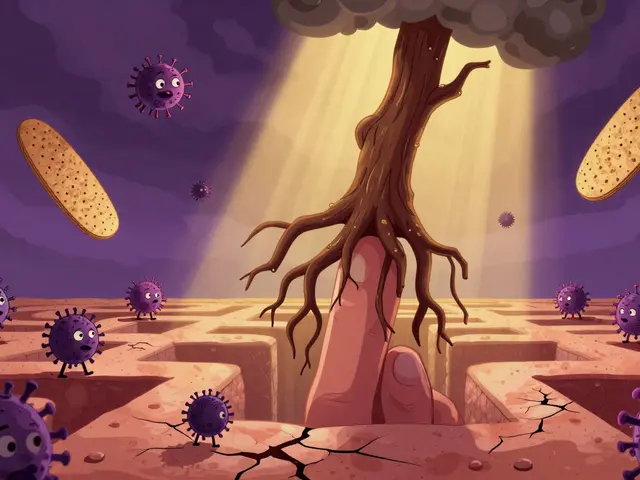
Understanding Warts and Their Causes
Warts are small, rough growths that typically occur on the hands and feet but can appear anywhere on the body. They are caused by various strains of human papillomaviruses (HPV). Different types of warts are classified according to their appearance and the part of the body they affect. Warts are contagious, and they spread by contact with the wart or something that touched the wart.
It's important to understand that while several treatment options are available for warts, not all options are suitable for everyone. Treatment can range from over-the-counter solutions to surgical procedures, and the effectiveness varies from person to person. Some warts disappear without any treatment, but others can persist for years.
The Power of Essential Oils
Essential oils have been used for centuries for their healing and therapeutic properties. They are concentrated extracts from plants, possessing the aroma and medicinal properties of the plant. Essential oils can be used in various ways, including inhalation, topical application, and sometimes oral consumption. However, they should be used with caution as they are potent, and improper use can lead to adverse effects.
Recent research shows that some essential oils have antiviral properties, making them potentially effective in treating viral infections such as warts. Essential oils are not a guaranteed cure for warts, but they can support your body's natural ability to heal.
Tea Tree Oil and Its Antiviral Properties
One of the most popular essential oils for treating warts is tea tree oil. Tea tree oil is renowned for its antiviral, antifungal, and antibacterial properties. It is believed to help by killing the virus causing the wart, preventing further spread, and boosting the immune response.
To use tea tree oil for warts, it should be applied directly to the wart using a cotton swab. It's best to use it consistently, at least twice a day, until the wart disappears. However, keep in mind that while tea tree oil is generally safe for topical use, it can cause skin irritation in some people. Therefore, it's important to do a patch test first.
Lemongrass Oil and Its Healing Capabilities
Another essential oil that may help with wart treatment is lemongrass oil. Lemongrass oil is known for its antiviral and anti-inflammatory properties. It may help to reduce the size of the wart and prevent the virus from spreading.
Like tea tree oil, lemongrass oil should be applied directly to the wart using a cotton swab. However, it is a potent oil, and it's recommended to dilute it with a carrier oil like coconut oil before application. Always remember to do a patch test to ensure it doesn't irritate your skin.
Oregano Oil’s Effect on Warts
Oregano oil is another essential oil noted for its potent antiviral properties. Research has shown that it can effectively kill viruses, making it a potential treatment for warts. Oregano oil can be applied directly to the wart, but due to its potency, it should always be diluted with a carrier oil.
Keep in mind that oregano oil is a hot oil, which means it can cause a warming or even burning sensation when applied to the skin. It's also not recommended for pregnant women or children. As always, it's crucial to do a patch test before using it on warts.
Precautions When Using Essential Oils
While essential oils can offer a natural alternative to traditional treatments, they should be used with caution. Essential oils are potent substances, and improper use can lead to skin irritation, allergic reactions, and other adverse effects. Always dilute essential oils with a carrier oil before applying them to the skin, and do a patch test to check for any allergic reactions.
Remember, essential oils are not a guaranteed cure for warts. They can support your body's natural healing process, but they may not work for everyone. Always consult with a healthcare provider before starting any new treatment for warts, especially if you have underlying health conditions or are pregnant or breastfeeding.






15 Comments
The article tries to sound scientific but overuses buzzwords and neglects basic medical advice.
/p>For anyone considering essential oils, always do a patch test on a small area of skin first. Mix a few drops with a carrier oil like coconut or jojoba, apply it, and wait 24 hours to watch for any redness or itching. If you notice irritation, discontinue use immediately. Also remember that while these oils may have antiviral properties, they are not a substitute for professional medical treatment, especially for persistent or painful warts.
/p>Oh great, another miracle cure that probably burns my skin.
/p>I've been following natural remedies for a while, and I have to say that the whole essential‑oil‑for‑warts conversation is both intriguing and fraught with nuance. First, the viral nature of HPV means that any topical agent has to either directly inactivate the virus or stimulate the local immune response enough to clear the infection. Tea tree oil does have documented antiviral and anti‑inflammatory effects, which could theoretically reduce the wart’s viral load. However, the concentration matters-a 100% pure oil can be irritating, so diluting it in a carrier oil is wise. Lemongrass oil brings its own anti‑inflammatory benefits and a pleasant citrus scent, but like most essential oils, it can cause dermatitis in sensitive individuals. Oregano oil is perhaps the most potent of the bunch; its phenolic compounds have strong antimicrobial activity, yet that potency also translates to a burning sensation on the skin, making it unsuitable for delicate areas. A practical regimen might involve a 1% dilution of the chosen oil, applied twice daily with a cotton swab, while carefully monitoring the site for any signs of irritation. Consistency is key-wart removal can take weeks or months, and stopping treatment prematurely often leads to recurrence. It’s also worth noting that not all warts respond equally; plantar warts, for instance, are notoriously stubborn and may require more aggressive treatment. Finally, while anecdotal reports are encouraging, the scientific literature still lacks large‑scale, double‑blind trials to definitively prove efficacy. In short, essential oils can be a supportive adjunct, but they shouldn't replace conventional therapies when those are indicated.
/p>Honestly folks putting essential oils on warts is just marketing hype they just want u to buy more stuff its not proven and can burn ur skin
/p>I tried tea tree oil once, it irritated my finger a bit, but the wart seemed to shrink after a few weeks. It wasn’t a miracle cure, yet the gentle anti‑inflammatory action helped the skin heal.
/p>Many cultures have used plant extracts for skin issues for centuries, and essential oils fit into that tradition. While we should respect modern medicine, there’s room for these natural remedies when used responsibly.
/p>I think mixing oregano with a bit of coconut oil could boost its antiviral punch while keeping the skin calm.
/p>Wow, the idea of using a few drops of nature’s own pharmacy to zap warts is both bold and exciting! If you’re brave enough, give it a go-just remember to patch‑test first.
/p>Everyone’s experience can be different, so it’s good to share what works and what doesn’t, helping each other make safe choices.
/p>Essential oils have some antiviral properties but they’re not a guaranteed fix.
/p>Hey folks, just a heads‑up: while a splash of tea tree oil might help some warts fade, it can also cause a nasty rash if you’re sensitive. Always dilute and test!
/p>Essential oils can aid healing, but they’re not a substitute for medical advice.
/p>Sure, slap some oregano oil on a wart and expect it to disappear instantly-because that’s how biology works, right?
/p>Kevin makes an excellent point about the balance between potency and safety, and I’d like to expand on that philosophical angle. The human body, after all, can be seen as a micro‑ecosystem where external agents interact with innate immunity. When we apply an oil rich in phenolics, we’re not merely delivering a chemical; we’re invoking a cascade of cellular signals that may tip the scales toward viral clearance. Yet, the very same cascade can trigger inflammation that, if unchecked, harms healthy tissue. This duality reminds me of the ancient principle of hormesis-where a dose that’s too low does nothing, and a dose that’s too high causes damage. Therefore, the art lies in finding that sweet spot, perhaps through gradual titration and close observation. Moreover, community anecdotes, while not clinical evidence, provide valuable real‑world data that can guide personal experimentation. In sum, essential oils may serve as complementary tools, bridging the gap between folk wisdom and modern dermatology, provided we respect both their power and their limits.
/p>